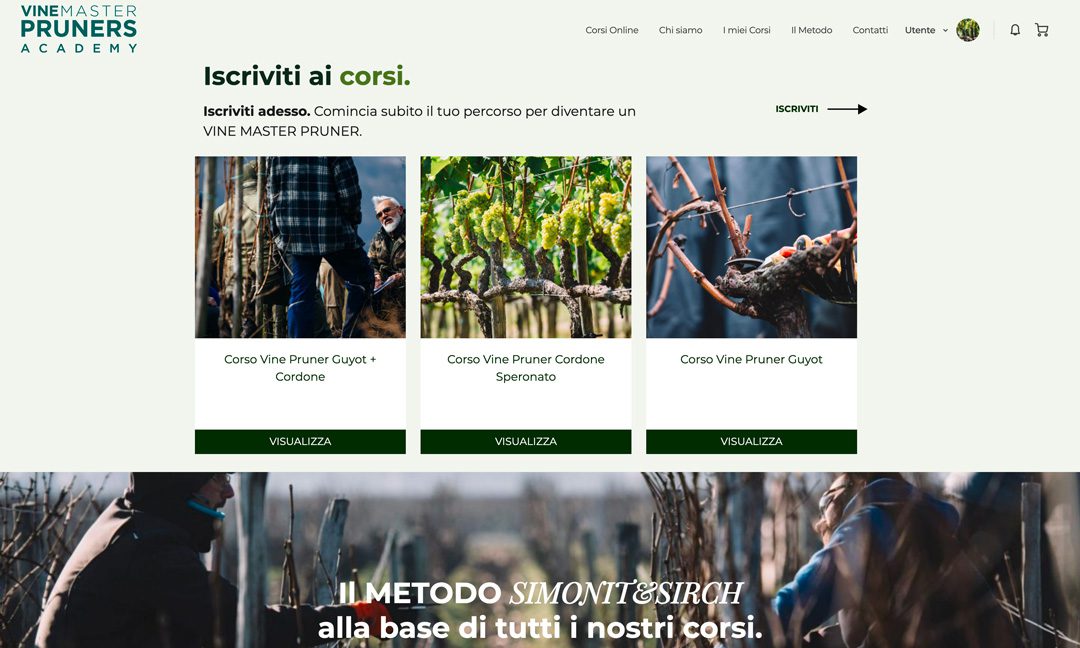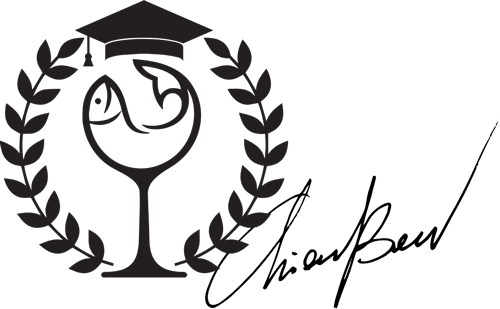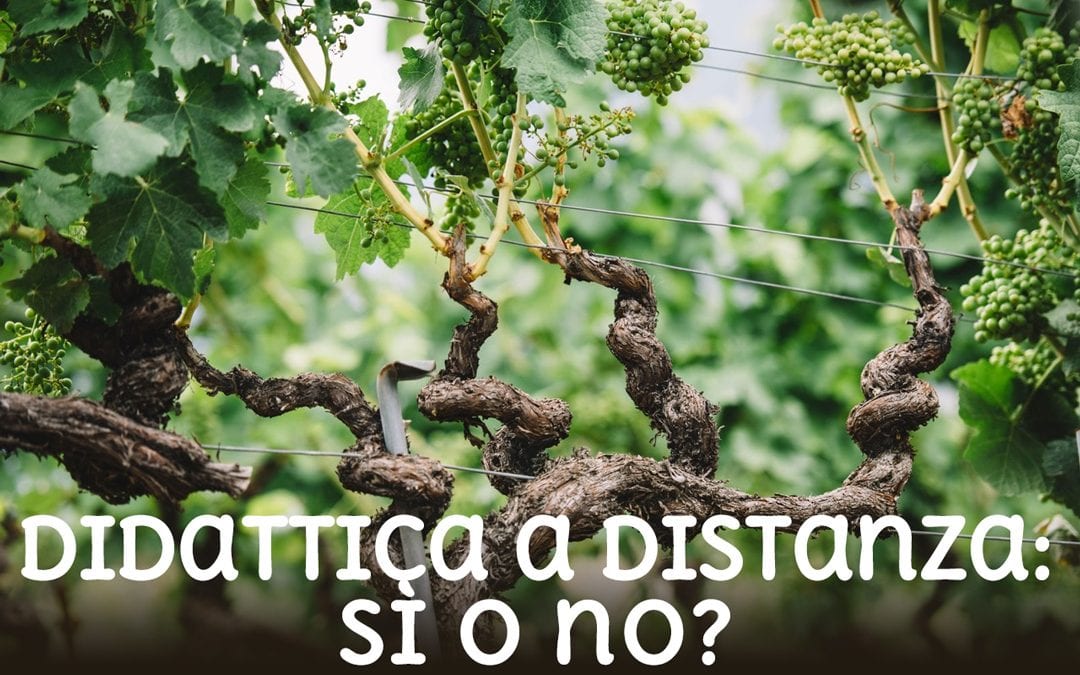When I realised that the Coronavirus would last more than a few months and impact my working life in a major way, I decided to take the bull by the horns and enrol in university. Since I am no longer always on the road like before, I have much more free time, which I decided to spend doing the most precious thing of all: studying! In my life I have tried various types of traditional education: from the State Art School to the University of Construction Engineering, through to lectures at the Italian Sommelier Association and various courses at the various National Research Centres on Italian soil. What I lacked was the experience of the distance learningcarefully organised by a telematics school or university. I will be honest, I did not embark on this experience voluntarily, although I have been working in Smart Working since 2012 and fighting for freedom of place practically all my life. I found myself undecided between Gastronomic Sciences and Oenology and I confess that I could not make up my mind. So, when almost by chance, the course came up in a search Gastronomy with a focus on oenology and viticulture I admit I was really moved! I had found the perfect degree for me! Honestly, I would have chosen this course even if it was ET on Mars.
When I found out it was a telematics university, I believed in destiny for the second time (the first was when I met my husband Francesco). Finally, the university is 'On Demand' like Netflix! I don't even watch TV because I hate having to adapt to other people's schedules, go figure!
Do you want to know my study plan?
- Food and wine science and technology
- Theories and practices of wine narration
- Design and gastronomy
- History of food and wine
- Geography of wine production
- English language
- Choice teaching
- Field and cellar experiences
- Economy of wine and territories
- Economics and management for gastronomy and hospitality
- Ecology and sustainability
- Anthropology of taste
- Marketing for the wine and oenological sector
- Economic history
- Food and wine law
- Nutrition and dietetics
- Statistics for tourism and gastronomy
- Applied statistics
- Food chemistry
- Wine microbiology
- Informatics
(The courses crossed out are those I have already taken!🤩)
Distance learning: University on demand
Why do I like the concept of the Telematics University? Its new way of understanding thecompulsory attendance. Contrary to popular belief, there is an attendance requirement: if I have not attended at least 80% of the lessons of a course, I cannot register for the exam. The good news is that I follow the lectures wherever and whenever I want: even while taking those famous 10,000 steps a day, right from my smartphone! I had a double university experience at the Faculty of Engineering of the Alma Mater Studiorum, at the Bologna campus and the Ravenna campus. In the Bologna campus, the lectures were impossible to follow: we were divided by surnames into A-K and M-Z and yet there were still more than 200 of us in classrooms that barely contained 100 souls. Crammed against the walls, standing for up to 8 hours a day and far away from the professor whom I sometimes saw for the first time in my face on exam day. I will not comment on the computer room with a few dozen pre-war machines (it was the 2004/2005 academic year). But what did I need to attend in presence? In Ravenna, on the other hand, things were much better: the campus was small and there were relatively few of us so we had seats and even computers available!
This new way of understanding the university 'on demand' is a revolution that I find absurd that it has not already involved all universities. Don't get me wrong: I am not saying that the university per se should not exist, but I do believe that it would be sacrosanct to record lectures even in traditional universities so as to give the student the possibility to choose according to his time, his financial means, or even simply because face-to-face lectures are unfeasible because they are overcrowded! Then of course, it will not be possible for all subjects, but I am sure it is more those where distance learning is more convenient!
Distance learning: Why study and productivity need to be rethought
Sooner or later the Coronavirus will end. Just like the plague or cholera epidemics have ended. There will be a return to normalcy, but to what normalcy? Will there be a new normal where study and productivity have changed shape?
We must think of the study as a liquid that adapts to the vessel in which it is contained. Today, education is frozen in an obsolete system that absolutely sucks. And let it be clear that this is certainly not the fault of the professors, who are as much victims as the students of a sick world. Most schools and universities are falling apart and there are few or no technological devices. Students take overcrowded transport to overcrowded classrooms with chalk and chalkboards. In 2021. Then the Coronavirus arrives and instead of buying tablets or at least giving them a whitewash they buy ingenious rolling desks. Since I don't want to believe that the person who made that decision (I admit I don't know who it is because I don't follow politics as I'm absolutely disgusted by it) is an absolute moron, I prefer to think that he gave some of his friends some work... after all, we're talking about more than 300 million euros, right? Now, without bothering with the latest generation iPad, a decent tablet costs 150€ (imagine if you agree with a big techie to buy millions of them how much he charges you!): you could have bought over 2 million of them, maybe even 3!
Well, leaving controversy aside, I want to believe that the Coronavirus will be followed by a new normal. I need to believe that a radical transformation of the way we study and the way we work is already underway. Also because let's face it: Measuring productivity in hours spent at the bench or desk is demented. One on the desk or at the desk can take a nap/fooling around. This quantitative measure tells us nothing about the quality of the time spent and therefore cannot be a correct and contemporary indicator of productivity. I am reminded of old sayings about warming the seat o making a presence. As someone who has been self-employed for almost 10 years, I think it is crucial to evaluate performance and achieved goals. Whether a student/worker gets there in 1 hour or 10 hours what does it matter?
I took three university exams of 8 credits each in 2 ½ months. I don't see what should matter how many hours I spent studying for each one, what matters is the result, i.e. 1) having passed them and 2) the final grade. Setting weekly targets should be the basis for constantly monitoring student and worker productivity.
Distance learning: the limits
I personally see only 2 limitations in the implementation of permanent distance learning large-scale:
- There are students who do not want to do anything (I firmly believe that 9 times out of 10 it is the parents' fault).
- There are students who need to socialise (No, not everyone: I, for example, am all too well on my own and I was like that even as a child: I loved to isolate myself drawing!).
Therefore I believe it is a sustainable solution are for university students or for courses reserved for knowledgeable adults. Younger students are not ready for this kind of approach, which requires great responsibility and a deep sense of duty. This is why I believe that distance learning should, for the most part, change the university system to make it as on-demand as possible.

A virtuous case: VINE MASTER PRUNERS Academy by SIMONIT&SIRCH
Since I just gave you such a head's up about the beauty of distance learning, I want to point out a course that I think is definitely worth trying. My beloved best man Marina Tagliaferri of the Agora press agency has just informed me that dear Marco Simonit has fulfilled his promise to digitise his vine pruning school.
La Vine Master Pruners Academy is the world's first digital platform entirely dedicated to vine pruning training. I founders of the Italian Vine Pruning School and other Pruning Schools abroad, as well as the DUTE - Diplôme Universitaire de Taille et Épamprage in Bordeaux, the world's only university diploma in pruning, has opened up to the smart by combining online tests and practical trials in the vineyard. The platform - in Italian and English - offers a real training course structured at various levelswhich can be chosen according to one's interests and needs.
The basic course is the VINE PRUNERin which the basics of the SIMONIT&SIRCH METHOD are taught on the most common training forms, namely Guyot and Spurred Cordon. With the VINE PRUNER ADVANCEDstructured in two modules, Guyot and Cordone Speronato can be explored in depth in the phases of training and management over time, and a space is dedicated to the restructuring and conversion of existing vineyards. The levels VINE PRUNER EXPERTalso in two modules, examine the typical shapes of the world's most important wine-growing districts. Selected according to one's interests, these are currently the only pruning courses in the world on the forms of farming in the various territories, explained as never before. If you are aiming for the title of VINE MASTER PRUNER you will have to prove your skills in pruning all forms of vine training in use in the major international districts.
I am honest: initiatives like this really make me believe that a new normal is possible!
What can I say? I can't wait to try it and take some courses to enrich my education! Dear Marco, will you invite me to discover my beloved Champagne?
Cheers 🍷
Chiara
P.S. I recommend this article Marco Simonit: 'Arms stolen from agriculture? Not at all!"
P.P.S. As always, I remind you that you can scroll down the page and leave me a comment!


